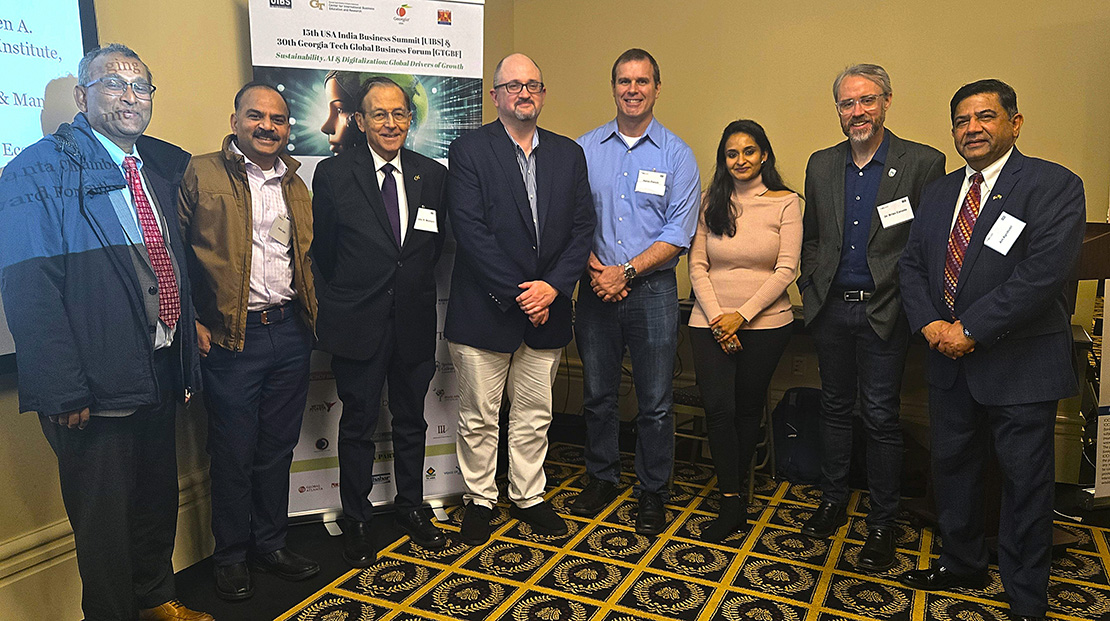

KENNESAW, Ga. | Jul 9, 2025
With the rise of artificial intelligence continuing to drive conversations about the technology’s impact on business, government, and culture, two Kennesaw State University AI experts attended the 15th annual US-India Business Summit this year, where they praised the productivity gains AI can bring, while warning about the dangers of over relying on it.
Associate Professor of Marketing Prachi Gala and Assistant Professor of Information Systems Aaron French presented at the US-India Summit, held in February on the Georgia Tech campus. This year’s summit focused on AI and digitalization, specifically on how the explosion of AI technology will affect the U.S. and India’s economies.

Gala and French were invited due to their prolific work on AI research and application. Since 2023, French has published six journal articles on AI-related topics, including how AI is changing information systems and how watchdogs can use it to prevent the spread of misleading news stories on social media, and has moderated or presented in AI panels in Panama and Saudi Arabia. Meanwhile, Gala has presented at conferences and workshops around the world on how AI is changing the way companies market their products and how universities teach the next generation of marketing professionals.
“The summit offered a rare, cross-industry, cross-continent perspective on AI,” Gala said. “It is becoming clear how AI is not only disrupting traditional business models, but also redefining how brands connect with consumers. The summit encouraged thoughtful dialogue about the opportunities and ethical considerations of using AI in marketing across cultures and across markets.”
Gala described several ways marketing teams are now leveraging AI, such as using generative AI to create video, text, and images for marketing content, implementing conversational AI to manage customer interactions, and relying on algorithms to analyze marketing metrics to determine the best ad placements.
She said the most exciting innovation is the development of predictive personalization, where machine learning models can anticipate consumer behavior and deliver tailored content in real time. Whereas marketers have long served advertisements to buyers based on their purchase habits, predictive personalization means they can receive ads based on how they are feeling.
While AI has helped countless people improve their productivity, it has also led some people to put more trust in the technology than they should. French is studying AI from the perspective that it may be as susceptible to the Dunning-Krueger effect as humans are. The Dunning-Krueger effect refers to a person’s ability to overestimate their skill in a subject they have very little knowledge of.
This applies to AI because it is common for tools like ChatGPT to provide incorrect information or even lie to the user. But, because AI presents the information authoritatively, users fail to question it. French said that professionals should use AI to assist them with their jobs, never to do their jobs for them.
“I hope people realize that just using AI will not save your job, nor will it allow you to take the job of someone who doesn’t use AI,” French said. “It’s all about how you leverage AI so that you as a person bring value to the company by enhancing your own capabilities. If you are just a user, then you are serving as a proxy for AI’s results, and your role will eventually be automated and you will be replaced by AI.”
Other presenters at the US-India Summit included the Consuls General of India and Switzerland, the president of global technology firm Tech Mahendra, and professionals and academics from around the word. The US-India Summit is organized each year by the Georgia Tech Center for International Business and Research, the Georgia Department of Economic Development, and the US India Business and Research Center. Its goal is to encourage bilateral cooperation that benefits both countries.
As both countries – and the world – grapple with AI’s encroachment into all facets of society, Gala said that events like this summit help provide a roadmap for a responsible approach to the technology.
“Partnering with academic institutions, like the collaboration seen at the summit, is crucial to staying ahead of the curve and ensuring innovation is grounded in research and responsibility.”
-Patrick Harbin